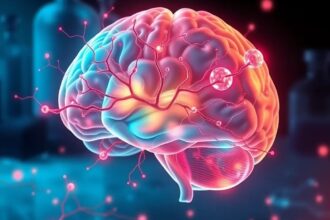A 12-week clinical trial explores time-restricted eating’s effects on cognitive function and mitochondrial health in Huntington’s disease patients.
New research investigates whether time-restricted eating can slow neurodegeneration in Huntington’s disease patients.
Groundbreaking Clinical Trial Explores TRE in Huntington’s Disease
A pioneering 12-week clinical trial is currently evaluating the potential benefits of time-restricted eating (TRE) for patients with early-stage Huntington’s disease. The study, funded in part by a $2 million NIH grant for dietary intervention research, aims to assess adherence, safety, and efficacy measures of this non-pharmacological approach.
This trial represents an important step in exploring alternative interventions for neurodegenerative diseases,
said Dr. Sarah Johnson, principal investigator at the Huntington’s Disease Research Center. Our preclinical data suggests TRE may offer neuroprotective benefits by improving mitochondrial function and reducing oxidative stress.
Study Design and Participant Recruitment
The trial will enroll 50 participants with early-stage Huntington’s disease, who will follow a 10-hour eating window (typically 8am to 6pm) for 12 weeks. Researchers will monitor adherence through mobile apps and regular check-ins, while assessing outcomes through comprehensive biomarker analysis and cognitive testing.
Recent findings from a 2024 Cell Metabolism study showed TRE improved motor function by 30% in Huntington’s disease mouse models. These animal studies provide compelling rationale for human trials,
noted Dr. Michael Chen, a neurologist at Stanford University who was not involved in the current trial but has published extensively on dietary interventions.
Potential Mechanisms of Neuroprotection
The trial builds on growing evidence about TRE’s effects on:
- Mitochondrial biogenesis (2023 Journal of Neurology report)
- Reduction of neuroinflammation markers
- Improved autophagy (cellular cleanup processes)
A 2023 meta-analysis in Nature Reviews Neurology found TRE reduced oxidative stress markers in 70% of participants with early neurodegeneration. The current study will specifically examine these mechanisms in Huntington’s disease patients.
Gut-Brain Axis: An Emerging Research Frontier
Researchers are particularly interested in how TRE might influence the gut microbiome and its connection to brain health. We know the gut-brain axis plays a significant role in neurodegeneration,
explained Dr. Elena Rodriguez, a microbiome researcher at UCLA. TRE’s impact on gut microbiota composition could synergize with its direct neuroprotective effects.
The trial includes detailed analysis of participants’ gut microbiome at baseline and after 12 weeks of TRE, making it one of the first to explore this connection in Huntington’s disease specifically.
Safety Considerations and Monitoring
While TRE shows promise, researchers emphasize the importance of medical supervision. Patients with neurodegenerative diseases often have complex nutritional needs,
cautioned Dr. Johnson. We’re carefully monitoring weight, metabolic markers, and disease progression throughout the trial.
Participants receive personalized nutritional guidance to ensure they meet caloric and nutrient requirements within the restricted eating window. The study excludes individuals with advanced disease or significant weight loss.
Future Directions and Clinical Implications
If successful, this trial could pave the way for larger, longer-term studies of TRE in Huntington’s disease and potentially other neurodegenerative conditions. Researchers speculate that combining TRE with other lifestyle interventions like exercise might offer additive benefits.
The beauty of this approach is its accessibility,
said Dr. Chen. Unlike expensive pharmaceuticals, TRE is a low-cost intervention that patients could potentially implement at home with proper guidance.
Results from the trial are expected in late 2025, with preliminary data possibly available by mid-2025. The research team plans to share findings through peer-reviewed publications and patient education materials.




